
- Subject:
- Education
- History
- World History
- Material Type:
- Homework/Assignment
- Provider:
- CUNY Academic Works
- Provider Set:
- Hostos Community College
- Author:
- Lundberg, Karin
- Date Added:
- 01/01/2020










This class is Introduction to Black roots from ancient Africa to contemporary America as an orientation to the nature of Black Studies emphasizing its relationships to world history, Europe, Asia, the Americas, slavery, Reconstruction, colonization, racism, and their politico-economic and cultural impact upon African descendants worldwide. In this course we will learn to do close readings of texts to draw evidence from them and use that evidence to produce well developed, historically situated arguments using evidence to support conclusions. Students will evaluate evidence and arguments critically and analytically to build their critical thinking skills.
Finally, students will gather, interpret, and assess information from a variety of sources and points of view.

This course asks students to consider the ways in which social theorists, institutional reformers, and political revolutionaries in the 17th through 19th centuries seized upon insights developed in the natural sciences and mathematics to change themselves and the society in which they lived. Students study trials, art, literature and music to understand developments in Europe and its colonies in these two centuries. Covers works by Newton, Locke, Voltaire, Rousseau, Marx, and Darwin.

The Art & Architecture of Africa course (OL90) is designed to be an historical study of the plastic arts and traditional architecture produced by indigenous African societies from ancient Egypt down the Nile Valley to Central, East and Southern African regions. It also includes a broad overview of contemporary art practices across the continent.

This method and enclosed materials developed by Professor Lea W. Fridman, Ph.D., uses Permanent Teams, a rotating Team Leader and the use of social media and group chats to facilitate student teams as support.
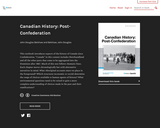
This textbook introduces aspects of the history of Canada since Confederation. “Canada” in this context includes Newfoundland and all the other parts that come to be aggregated into the Dominion after 1867. Much of this text follows thematic lines. Each chapter moves chronologically but with alternative narratives in mind. What Aboriginal accounts must we place in the foreground? Which structures (economic or social) determine the range of choices available to human agents of history? What environmental questions need to be raised to gain a more complete understanding of choices made in the past and their ramifications? Each chapter is comprised of several sections and some of those are further divided. In many instances you will encounter original material that has been contributed by other university historians from across Canada who are leaders in their respective fields. They provide a diversity of voices on the subject of the nation’s history and, thus, an opportunity to experience some of the complexities of understanding and approaching the past. Canadian History: Post-Confederation includes Learning Objectives and Key Points in most chapter sections, intended to help identify issues of over-arching importance. Recent interviews with historians from across Canada have been captured in video clips that are embedded throughout the web version of the book. At the end of each chapter, the Summary section includes additional features: Key Terms, Short Answer Exercises, and Suggested Readings. The key terms are bolded in the text, and collected in a Glossary in the appendix.
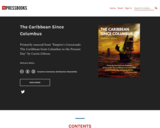
The syllabus, slides, examinations, and assignments provided were produced using several sources. They were created with the purpose of imparting, to students, the information and knowledge necessary to earn 3 college credits. Said credits will be awarded upon completion of the HIST277: The Caribbean since Columbus curriculum and with the satisfactory achievement of the course’s objectives; a description of which is provided in the syllabus. These materials were also created to facilitate the instruction of said material as conducted by my fellow instructors, teachers, and professors.

This course covers the role of physics and physicists during the 20th century, focusing on Einstein, Oppenheimer, and Feynman. Beyond just covering the scientific developments, institutional, cultural, and political contexts will also be examined.
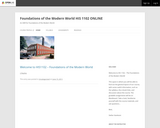
A chronological and thematic introduction to the history of European interaction with the wider world from the 1400s to the end of the 1800s. The course focuses on the central themes of global interconnectivity and discussions of nationalism, capitalism, colonialism, slavery, and trade. The purpose of this course is to give the student a taste of the people, events, triumphs, failures, anxieties, hopes, and fears that have shaped our histories and cultures.
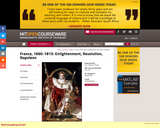
This course covers French politics, culture, and society from Louis XIV to Napoleon Bonaparte. Attention is given to the growth of the central state, the beginnings of a modern consumer society, the Enlightenment, the French Revolution, including its origins, and the rise and fall of Napoleon.
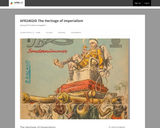
Welcome to The Heritage of Imperialism. This course offers an examination of the thought, structure, operation and results of imperialism in human history generally, and in the 19th/21st centuries in particular.
We will use readings and films to examine European/American imperialism in the non-white areas of the world: the role of the Industrial Revolution; the imposition of Western European institutions on indigenous peoples of Africa, Asia, North/South America; colonialism; attempts by these people to reestablish autonomous sociological and cultural system

This course aims to familiarize students with Puerto Rican and Latino Studies by providing an interdisciplinary survey of the field’s theoretical foundations. The course overviews the important historical, political and economic context that has created and influenced the Puerto Rican and Latinx diaspora in the United States. It explores central themes within the discipline, including immigration, identity, gender and sexuality, education, activism, poetry, and literature. The course analyzes the influence of Puerto Rican and Latinx communities on urban centers, popular culture and politics.